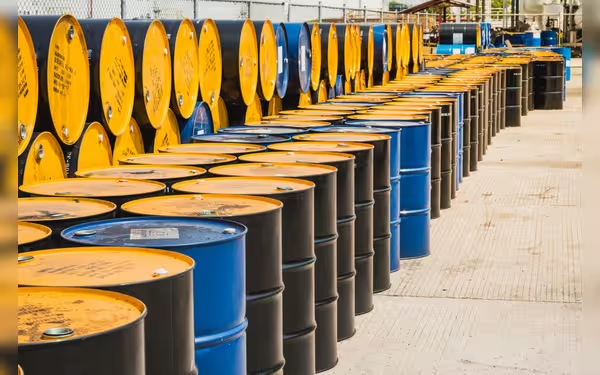Saturday, November 16, 2024 05:50 PM
Oil Prices Decline as Hurricane Rafael Weakens
- Oil prices drop amid easing Hurricane Rafael concerns.
- China's crude imports decline for six consecutive months.
- Investors cautious over US economic policies and oil demand.
 Image Credits: arabnewspk
Image Credits: arabnewspkOil prices fall as Hurricane Rafael weakens, while China's crude imports decline for six months, raising demand concerns.
Oil prices have taken a noticeable dip as concerns surrounding Hurricane Rafael's impact on oil and gas infrastructure in the US Gulf have begun to ease. This shift in sentiment comes at a time when investors are also considering new economic stimulus measures from China, the world's largest oil importer. As of Friday, Brent crude oil futures fell by 93 cents, or 1.23 percent, settling at $74.70 a barrel. Meanwhile, US West Texas Intermediate crude saw a decline of $1.05, or 1.45 percent, bringing it down to $71.31.
Despite this recent downturn, both Brent and WTI are still projected to finish the week with a 2 percent increase, following a nearly 1 percent gain on Thursday. Investors are closely monitoring how the policies of US President-elect Donald Trump may influence oil supply and demand in the near future.
Hurricane Rafael has significantly affected US crude oil production, causing a shutdown of approximately 391,214 barrels per day. However, forecasts from the US National Hurricane Center indicate that the hurricane is expected to weaken and gradually move away from the oilfields along the US Gulf coast in the coming days. This news has contributed to the easing of price pressures.
Adding to the downward pressure on oil prices is the recent data from China, which revealed a 9 percent decline in crude imports for October. This marks the sixth consecutive month of year-on-year declines, raising concerns about the demand for oil in the world's second-largest economy. Commerzbank analyst Carsten Fritsch noted, "The weakening of oil imports in China is due to weaker demand for oil as a result of the sluggish economic development and rapid advance of e-mobility."
In response to these economic challenges, China has announced a new round of fiscal support aimed at alleviating debt repayment strains for local governments. The country is grappling with strong deflationary pressures, stemming from weak domestic demand, a property crisis, and increasing financial strains on local governments, which limits their ability to invest.
UBS analyst Giovanni Staunovo expressed disappointment over the lack of additional stimulus measures targeting domestic demand, stating, "There were no additional stimulus measures targeting domestic demand, hence the disappointment weighing on prices." This sentiment reflects the cautious outlook among investors regarding the potential for a rebound in oil prices.
On Thursday, oil prices had seen a rise due to expectations surrounding the incoming Trump administration's potential actions, such as imposing tighter sanctions on Iran and Venezuela, which could restrict oil supply to global markets. PVM analyst John Evans commented, "In the short-term, oil prices might rise if the new President Trump is quick on the draw with oil sanctions."
Furthermore, US Federal Reserve Chair Jerome Powell indicated that Trump's proposed policies, including broad-based tariffs and tax cuts, would not have an immediate impact on the US economy. However, the Fed is beginning to assess how these policies might affect its goals of stable inflation and maximum employment. Notably, the Fed cut interest rates by a quarter of a percentage point on Thursday, reflecting a cautious approach to the current economic landscape.
The recent fluctuations in oil prices highlight the intricate relationship between natural disasters, global economic policies, and market demand. As investors navigate these complexities, it remains crucial to stay informed about both domestic and international developments that could influence the oil market. Understanding these dynamics can empower consumers and businesses alike to make informed decisions in an ever-changing economic environment.













